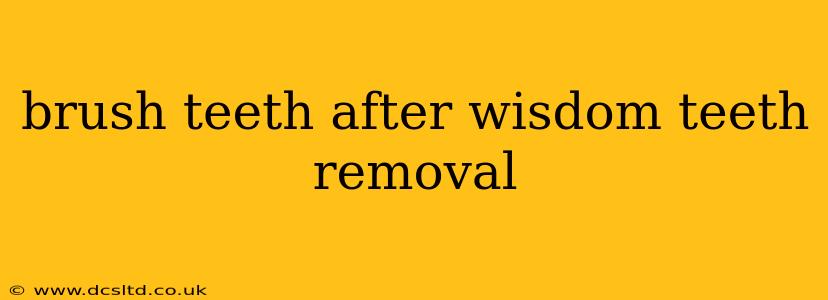Wisdom teeth removal is a common procedure, but knowing how to care for your mouth afterward is crucial for a smooth recovery. One of the most frequently asked questions is about brushing your teeth. This comprehensive guide will address this and other concerns to help you navigate the post-operative period effectively.
How Soon Can I Brush My Teeth After Wisdom Teeth Removal?
This is a crucial question, and the answer depends on the complexity of your surgery and your surgeon's specific instructions. Generally, you should wait at least 24 hours before brushing your teeth. This allows the initial blood clots to form, which are essential for healing and preventing dry socket (alveolar osteitis), a painful complication. Your surgeon will give you precise instructions tailored to your situation. Never disregard your dentist's advice; always follow their post-operative care plan meticulously.
What Kind of Toothbrush Should I Use After Wisdom Teeth Removal?
Once your surgeon gives you the all-clear to brush, choose a soft-bristled toothbrush. Hard bristles can irritate the extraction sites and dislodge blood clots. A child's toothbrush can be surprisingly effective and gentle in this context. Gentle circular motions are recommended, avoiding direct contact with the extraction sites as much as possible.
How Should I Brush My Teeth After Wisdom Teeth Removal?
Focus on brushing the areas away from the extraction sites initially. As healing progresses, you can gradually increase the amount of brushing near the sites, but always use extreme gentleness. Remember, the goal is to keep your mouth clean without disturbing the healing process. Rinse gently with saltwater (see below) before and after brushing.
What if I Have Stitches?
If stitches are present, be extra gentle. Avoid direct contact with the stitches as much as possible during brushing. Your surgeon will inform you when the stitches will be removed.
What if I Experience Bleeding?
Some minor bleeding is normal in the initial days after surgery. However, excessive bleeding should be reported to your surgeon immediately. If bleeding occurs while brushing, stop immediately, apply gentle pressure with a gauze pad, and contact your surgeon.
What Can I Use to Clean My Mouth After Wisdom Teeth Removal?
Beyond brushing, gentle rinsing is essential. A saltwater rinse (1/2 teaspoon of salt dissolved in 8 ounces of warm water) is often recommended. This helps to keep the area clean, reduce inflammation, and promote healing. Swish gently, avoiding forceful rinsing near the extraction sites. Your surgeon may also prescribe a specific mouthwash to help control infection and pain. Do not use any mouthwash that contains alcohol, as this can irritate the surgical sites.
How Often Should I Brush My Teeth After Wisdom Teeth Removal?
While you'll be more gentle in the first few days, maintaining a regular brushing routine is vital. Aim for brushing twice a day, just as you would normally, but with the added care and gentleness described above.
When Can I Resume My Normal Brushing Routine After Wisdom Teeth Removal?
You can typically resume your normal brushing routine after a week or so, provided the healing is progressing as expected. Again, follow your surgeon's specific post-operative instructions closely. They'll provide a timeframe that’s right for you based on your specific case.
What Happens if I Don't Brush My Teeth Properly After Wisdom Teeth Removal?
Failing to maintain proper oral hygiene after wisdom teeth removal significantly increases your risk of infection and dry socket. Dry socket is a painful condition that can prolong recovery time and require further treatment. Careful brushing and rinsing are critical parts of post-operative care.
By following these guidelines and adhering to your surgeon's specific instructions, you can ensure a smooth recovery and a healthy mouth following your wisdom teeth removal. Remember, maintaining excellent oral hygiene is crucial for preventing complications and promoting successful healing.
